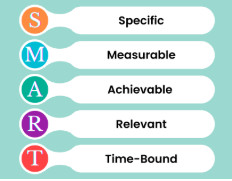Online learning offers incredible flexibility and opportunities to grow new skills. But to make the most of it, setting clear and achievable goals is key. One effective way to do this is by using the SMART goal framework.
What Are SMART Goals?
SMART is an acronym that helps you create goals that are:
Specific
Measurable
Achievable
Relevant
Time-bound
These elements keep your goals clear and motivating, making it easier to track progress and stay on course.
How to Set SMART Goals for Online Learning
1. Specific
Instead of a vague goal like “I want to learn more,” try to be specific:
Example: “I want to complete the ‘Introduction to Digital Marketing’ course.”
2. Measurable
Add a way to measure your progress:
Example: “I will complete one module each week and pass the final quiz with at least 80%.”
3. Achievable
Make sure your goal is realistic considering your time and resources:
Example: “I will dedicate 5 hours per week to studying after work.”
4. Relevant
Choose goals that align with your interests or career path:
Example: “This marketing course will help me improve skills needed for my current job.”
5. Time-bound
Set a deadline to create a sense of urgency:
Example: “I will finish the course within six weeks.”
Benefits of Using SMART Goals
Focus: Helps you prioritize what’s important
Motivation: Clear goals boost your commitment
Accountability: Measuring progress keeps you honest
Achievement: Breaking down big goals makes them manageable
Tips for Staying on Track
Use a planner or digital calendar to schedule study times
Join online study groups for support
Celebrate small wins to stay motivated
Setting SMART goals is a simple but powerful strategy to help you succeed in your online learning journey. Give it a try and watch your skills grow!














